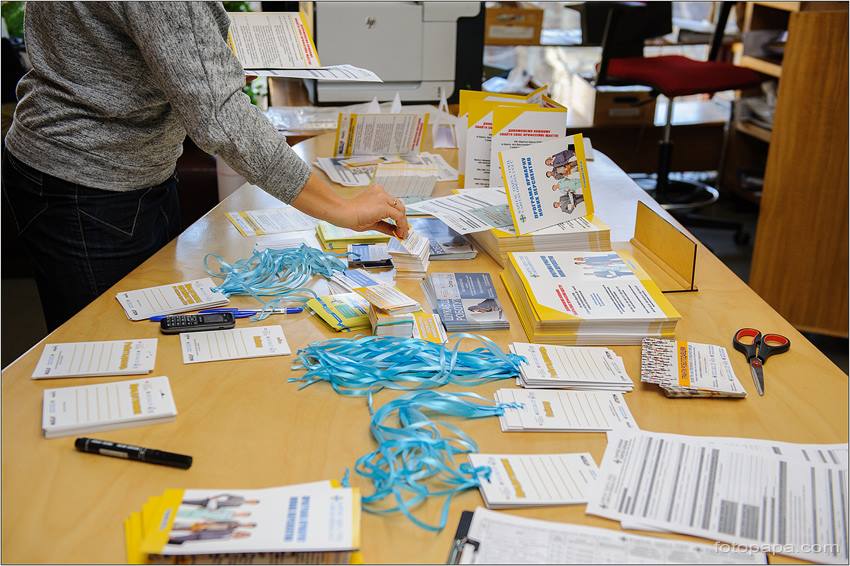
Job hunting is one of the biggest challenges for IDPs. Lack of employment and subsequently lack of a regular income are main obstacles for integration and living arrangements. UN experts estimate the level of unemployment among IDPs of 23% (with All-Ukrainian rate of 10%).
Caritas Ukraine “Employment for IDPs” project aims at assisting IDPs with employment or starting their own business. It encompasses professional education, business consulting and provision of individual grants for education and business start-ups, creation of work space and cooperation with employers. An integral part of the project is “Career for new life” website http://careerfornewlife.com – a social portal for assisting IDPs with employment.
However, dry figures of program reports, stating a number of professional trainings participants, employed IDPs, created workplaces, hide human destinies, interesting experience, stories of internal struggle and victory, and also new projects, which not only become a source of income for IDPs, but useful and essential for residents of cities and villages, which are now their new homes. And it is not only about opening of a new store or a barbershop, it is also about high-tech, innovative and consulting projects.
According to the Coordinator of Caritas Ukraine employment projects Valeriia Bielavkina, each successful story under our projects is a daily proof that we do things right and change people’s life for the better. “Amid crisis situations and events which happened in the country almost each person experienced crisis, felt fear and stress. To start a new life from a scratch, we need courage and understanding that we want changes. Stories like these enable not only benefactors, but also us to change. We stop being scared and start believing in what we are doing. It is extremely important that Caritas provides not only money and food kits under its activities, but also prospects, self-confidence, possibility to develop as a specialist, because sometimes knowledge and support are more important than money“, Valeriia Bielavkina explains.
First story. Sunny citizen of the Crimea
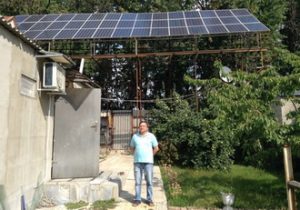 Oleksandr, a displaced person from the Crimea, has moved with his wife and two children and lives in Poltava now. Oleksandr is a kind of a person who can turn his hand to anything. He is a wireman and radio repairman by occupation. He had a relevant business – a small computer repair shop. And as the Crimea is a sunny place, he built himself an independent solar power station, which powered the house.
Oleksandr, a displaced person from the Crimea, has moved with his wife and two children and lives in Poltava now. Oleksandr is a kind of a person who can turn his hand to anything. He is a wireman and radio repairman by occupation. He had a relevant business – a small computer repair shop. And as the Crimea is a sunny place, he built himself an independent solar power station, which powered the house.
Having moved, he started a construction of the same power station in his new house. Initially, it served to cut family’s electricity costs, but when the Verkhovna Rada simplified the procedure for selling electricity in 2015, Oleksandr obtained an opportunity to transfer resources of the power station from autonomous electric power supply of the house to a commercial sale of the energy resource. The project required substantial financial investments, and Oleksandr had to support his family too, that is why information about business grants from Caritas was quite useful for him. He filed an application with the business plan and received the grant. The business started to develop rapidly. 42 solar panels give him an opportunity to stay not just power independent but also make money. Oleksandr says that within a month the sun helps him to produce about 1500 kW of electricity, one third of which goes for household needs and the rest is sold to Poltavaoblenergo.
Oleksandr is rather popular in Poltava. Local television films reports about him, people come for consultations. Seven other citizens of Poltava have launched their own solar power stations, using his model. At present his solar power station is not self-sustaining, but within just a couple of years it is to reach the target power and bring good income. But money is not his main motivation. Oleksandr does what he loves, which also contributes to Ukraine’s energy independence.
Second story. Socially responsible furniture makers
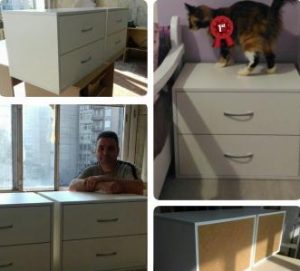 The beginning of Olga and Dmytro’s story is quite similar to stories of thousands of other IDPS. They used to live in Luhansk, both working for the research and production company. The war came into their city and the family ended up in Kharkiv. Housing problems, job search, first failures, but Olga and Dmytro are not those who give up easily or run into apathy.
The beginning of Olga and Dmytro’s story is quite similar to stories of thousands of other IDPS. They used to live in Luhansk, both working for the research and production company. The war came into their city and the family ended up in Kharkiv. Housing problems, job search, first failures, but Olga and Dmytro are not those who give up easily or run into apathy.
Today, they even do not remember where the idea of furniture making had come up, but information about the program for business support, found by coincidence on Facebook, was just in time. Friends dissuade them, but Olga and Dmytro took a risk and everything turned out well. They received money, purchased equipment, rented the room at a local factory and started working.
Dmytro is responsible for manufacturing and assembling, he has really hands of gold. Olga is in charge of administrative issues, sales, marketing, materials procurement. Together they are a very tight-knit team, producing quality furniture which quickly became popular in the city.
Olga likes to repeat that you should never be afraid to grow as success consists of small steps. There are a lot of opportunities around us and many kind people, you just have to learn to notice it.
Devoting almost all their time to the business, they still do not forget where they came from. The couple launched a permanent action to help other IDPs to get up on their feet. Conditions of the action foresee that displaced persons can buy the furniture at the cost of production without extra charges. This idea struck them as when they moved to Kharkiv, a lot of people helped them and now they also want to help others.
Third story. Shop assistant who unites people
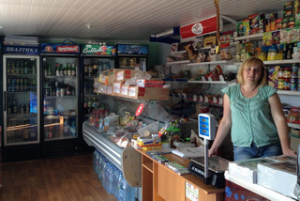 In 2014, Kateryna and her family moved to a small village in Poltava region. Although they faced difficulties with job search, which often happens in rural areas, the family stayed in the village as the owner leased the house just for its maintenance. The family started to settle in and plan their future. Before moving the house, Kateryna and her husband had a small business. To start up their business they first of all tried to assess what the village needed the most. The answer came with no delays. Several neighbouring villages had only one grocery shop with not very good reputation: spoiled goods for unreasonably high prices. There was enough space to develop the trade: a busy traffic flow along the main street to the regional center, farming enterprise located nearby and adjacent villages without stores.
In 2014, Kateryna and her family moved to a small village in Poltava region. Although they faced difficulties with job search, which often happens in rural areas, the family stayed in the village as the owner leased the house just for its maintenance. The family started to settle in and plan their future. Before moving the house, Kateryna and her husband had a small business. To start up their business they first of all tried to assess what the village needed the most. The answer came with no delays. Several neighbouring villages had only one grocery shop with not very good reputation: spoiled goods for unreasonably high prices. There was enough space to develop the trade: a busy traffic flow along the main street to the regional center, farming enterprise located nearby and adjacent villages without stores.
Kateryna and her husband decided to transform the extension to the house into a shop, started refurbishment… and at this point they ran out of money. The couple took advantage of a business grant of UAH 25,000 from Caritas. The money was used to buy a freezer and building materials to finish the refurbishment.
Finally, the shop was opened and quite soon it became a so-called center of the village. People come here to do the shopping and socialize. Kateryna maintains good relationships with everybody, sometimes, she can lend or help out when the shop is closed. People respect her, as the goods in her shop are of high quality, and she does everything thoroughly. At present, Kateryna is dreaming of expanding the shop, planting trees and decorating the adjacent territory. “Today, I can state with certainty ‘Knock and the door will be opened to you’. I thank Caritas every single day for helping us take the first step”.
Fourth story. From numbers to people
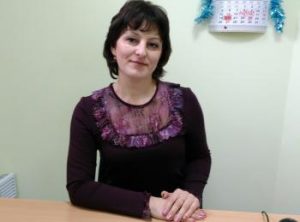 In 2014, Olena moved from Horlivka to Zaporizhzhia. He worked as a property assessment specialist. She could not find a job in her profession due to high competition and lack of business connections.
In 2014, Olena moved from Horlivka to Zaporizhzhia. He worked as a property assessment specialist. She could not find a job in her profession due to high competition and lack of business connections.
Olena sought support from Caritas, where staff of the employment project advised her to take part in “Successful mom” initiative for displaced temporary unemployed women. The initiative is aimed at psychological support and assistance for women to become more confident during the job search. Olena took a test which helped her find new skills and set the focus for job hunting. “Earlier, I was working more with calculations and technical documents. But the test showed that I have a potential to work with people, and I am able to work as an administrator or a social worker, so I decided to go for it”, shared the woman.
Today, Olena is an administrator of the Social business center, operating under Caritas Zaporizhzhia project “Ensuring basic needs of victims of the conflict in eastern Ukraine”. Moreover, she helps with the fund’s hotline.
“I like this work a lot, I am quite at home with it. The aim of our centre is provision of support for IDPs to develop and start up their own business. We give free legal and accounting consulting services. And I see that this is my real vocation”, Olena tells about her impressions.
Fifth story. Goats and workplaces
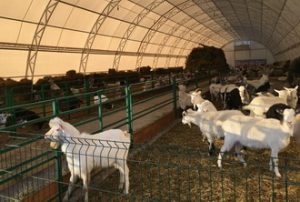 Elvira is a successful lawyer, Yan is a machine engineer. The family used to live in Makiivka until 2014,and now they are owners of a goat farm with three hundred goats in Studenok village, located on the border of Kharkiv and Donetsk regions. They also produce upmarket cheese, and not just produce, they even participated in exhibitions in France and Italy, where Ukrainian cheese was recognized as a masterpiece of cheesemaking.
Elvira is a successful lawyer, Yan is a machine engineer. The family used to live in Makiivka until 2014,and now they are owners of a goat farm with three hundred goats in Studenok village, located on the border of Kharkiv and Donetsk regions. They also produce upmarket cheese, and not just produce, they even participated in exhibitions in France and Italy, where Ukrainian cheese was recognized as a masterpiece of cheesemaking.
It is difficult to manage the farm alone and the couple needed to find employees. They got advantage of information published in social networks about Caritas grants for creating new workplaces. The family got support to set up five workplaces for dairywomen, animal breeder and sales manager and to purchase new equipment. The couple hired the same IDPs as they are, facing difficulties with employment in a small village. Elvira and Yan also received state assistance: during five month they were reimbursed salaries of these five employees from the payroll fund. Joint efforts of the business, charity fund and state allowed people to get a new job and open new opportunities.
Tags:

